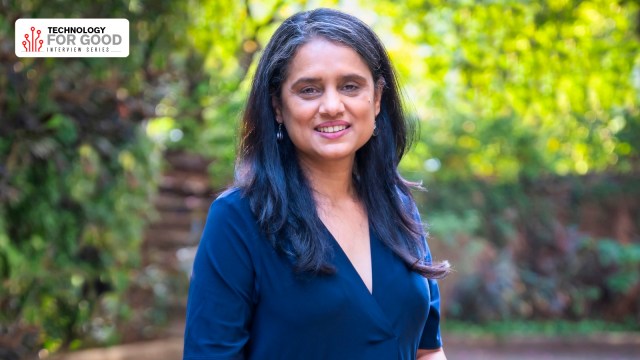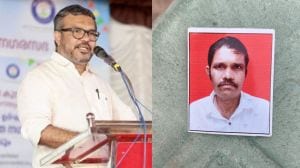Electric mobility is a vibrant sector and we are ecosystem builders: Shilpa Kumar, India Head, British International Investment
Shilpa Kumar, Managing Director and Head of India at British International Investment, highlights India’s leadership in climate tech and inclusion, emphasising tech-enabled solutions that balance impact, risk, and long-term growth.
 Shilpa Kumar, India Head, British International Investment (India's largest electric mobility funder). (Credit - Shilpa Kumar)
Shilpa Kumar, India Head, British International Investment (India's largest electric mobility funder). (Credit - Shilpa Kumar)Shilpa Kumar is the Managing Director and Head of India at British International Investment (BII), the United Kingdom’s development finance institution and impact investor. She is responsible for driving BII’s climate finance and inclusive growth investments across India.
BII invests in businesses in developing countries and has pledged to commit up to $1 billion in climate finance in India, over 2022-2026. India represents BII’s largest country-level investment portfolio with $2.5 billion invested across more than 600 businesses.
Before BII, Shilpa was a Partner at Omidyar Network India, where she led strategy and investments across responsible tech, climate, cities, and inclusive property initiatives. She has earlier served as the MD and CEO of ICICI Securities.
Shilpa Kumar spoke to indianexpress.com on BII’s investment and impact philosophy, their journey in India, and BII’s climate tech investments and interventions in India. Edited excerpts:
Venkatesh Kannaiah: Tell us about BII, its history in India, and what it seeks to achieve.
Shilpa Kumar: BII has a long history in India. As the UK government’s Development Finance Institution (DFI), our mission has always been to explore how capital can drive meaningful developmental change. India itself has evolved enormously over the years, and naturally, what BII did in the past and what we focus on today has also evolved.
In the earlier years, we helped establish new private banks and mortgage institutions, such as Axis Bank and HDFC, laying the groundwork for India’s modern financial sector.
As technology and innovation-driven entrepreneurship became the new engines of growth, we also became one of the early and significant investors in this space. We helped channel DFI capital into the startup ecosystem through venture capital and private equity funds. Today, our portfolio in India stands at around $2.5 billion.
This capital is spread across a wide spectrum: direct equity, direct debt, investments in platforms, as well as venture and private equity funds.
Venkatesh Kannaiah: Tell us about your idea of impact and the areas that you focus on in India.
Shilpa Kumar: Our biggest priorities are climate and inclusion.
We have a publicly stated target for climate investments. Nearly half of our capital is now invested in climate finance. We focus on reaching lower-income and aspiring populations, supporting gender inclusion, and empowering MSMEs. These remain central to our work.
For us, tech does not always have to be the starting point, it can be tech-first in some cases, tech-led in others, or simply enabled by digital models. Since digital infrastructure is already well established in India, especially in payments, our focus is shifting to what comes next.
Take lending, for example. Technology has streamlined parts of the process but hasn’t yet solved the fundamental credit-risk challenge. The ability of players to underwrite and manage credit risk at scale is still developing.
Venkatesh Kannaiah: Tell us about your investments in India that you think have created an impact.
Shilpa Kumar: Let me start with some of our larger investments. Take Energrid, for example, which is a platform we’ve set up with equity.
When you think about renewables, there’s a lot of focus on building solar and wind projects. But along with that, you also need to be able to evacuate it from where it’s generated to where it’s actually needed. That’s where we saw a real opportunity to come in with risk capital, and that’s how Energrid was born. The idea was to mobilise capital at scale for transmission projects across the country.
Even though renewables are growing fast, if you look at the actual setup of a solar plant, there’s still a lot of dependence on imports. So, we saw an opportunity to back entrepreneurs who wanted backward integration: to build capacity in what goes into making solar panels.
One example of that is ReNew. Now, ReNew was already a major player in India’s renewable space, but they were taking on a new project to move into solar cell manufacturing. We thought that was a great opportunity, both for vertical integration and for strengthening India’s supply chain. So we supported that with equity, again, as risk capital.
There is Akshayakalpa, which is an organic milk producer. Their model is built around working with smallholder farmers, helping them adopt organic dairy practices. To really scale it, you need a strong tech backbone, especially for sales, logistics, and distribution. So, in that sense, it’s quite tech-led. The other part is farmer financing. Because for a farmer, even buying the first cow takes capital. We have partnered with a guarantee company called FinReach to tackle the issue. The idea is that we provide a small guarantee, which FinReach manages, and that, in turn, helps unlock much more lending from NBFCs.
For a lot of tech and innovation-led ideas, especially in newer spaces, we like to work through VC and private equity because they are great at spotting early opportunities.
We also back funds in the circular economy space because they help identify good ideas early on, fund them, and as those ideas mature, we do direct investments later on.
We have also done direct lending in areas like housing, particularly to encourage women’s property ownership. One of our core beliefs is that women owning homes is fundamental to real inclusion.
Venkatesh Kannaiah: What is unique about BII?
Shilpa Kumar: If you are at the intersection of technology and climate, you would notice that there is a lot of disruption happening in the electric mobility space.
We have actually made more than a dozen investments across different parts of the electric mobility value chain. It’s quite a unique portfolio, around $330 million in total, from manufacturing to sales to the broader ecosystem.
In electric mobility, it’s not just about manufacturing or funding, it’s about building the entire ecosystem: what happens to the battery, how charging infrastructure is managed, how to address the fact that financiers are often hesitant to provide high loan-to-value ratios, and so on.
So, our portfolio really covers the full spectrum from two-wheelers, three-wheelers, four-wheelers, and buses, to fleet management, sales, and charging infrastructure.
On the sales side, we have invested in companies that focus on financing and assuring battery performance. And in the ecosystem space, we have backed companies like ChargeZone, which builds charging infrastructure, and BatterySmart, which offers battery-swapping solutions.
The benefit of a broad portfolio is that we can cross-pollinate learnings: what we pick up in one part of the ecosystem helps strengthen another. That’s really how we are able to drive the entire electric mobility ecosystem forward.
In manufacturing, we have invested in Euler Motors, which is building impressive three- and four-wheelers. Another example is Mahindra, where we have supported their four-wheeler EV project.
In fleet management, through our fund investment, we have backed a platform called GreenCell, which operates large fleets of electric buses and provides public e-mobility services across cities.
And there is Vecmocon, which focuses on battery health diagnostics, essentially helping track how a battery performs and using that data to extend its life and efficiency.
Venkatesh Kannaiah: Tell us about the challenges that an organisation like BII faces in India.
Shilpa Kumar: I think at one level, because our capital is so flexible, the key is to make sure we are seeing the full range of opportunities and able to pick the most optimal ones.
India is a hub of innovation, and there are so many ideas coming up all the time. So really, it’s about sifting through them to get the right mix of risk, return, and impact. And with innovation, you also have to accept that some things will work and some won’t. It’s part of the process. So, for that kind of more experimental, early-stage work, we usually prefer to go through fund managers who can test and support multiple models.
Whereas for the larger, more established opportunities, we tend to come in directly.
Venkatesh Kannaiah: Tell us about what you look for and what works for you.
Shilpa Kumar: One of the things that works for us is being able to see what’s worked well in one area and then trying to replicate it or look for similar ideas in other parts of the world.
It goes without saying that India has been ahead in the innovation game for a number of reasons. At one level, of course, it’s the strength of our human capital; Indian talent is deeply focused on new ideas and innovation, and that’s been a huge advantage for us.
The second, equally important reason is our digital public infrastructure, the digital public goods that create a strong framework for so many innovations to build upon.
So, this combination of technology and entrepreneurial talent has really worked in our favour. And as you know, we have been around for quite a while, so we have seen that story play out across multiple sectors.
Quite a few of our newer tech investments are co-investments and relatively small in size. It is our model when it comes to new tech ideas, we like to come in early and work alongside other partners.
One example is a company called Wysa, which operates in the mental health space. Their entire model is about providing mental health support across multiple languages, making it accessible to a much wider audience. What was particularly interesting about Wysa is that we helped connect them with the UK’s National Health Service (NHS). The NHS found their model compelling and decided to partner with them, which really helped Wysa expand globally. So, that’s a good example of an Indian innovation that started here, but then went on to make an impact internationally.
Another example is CureBay, which operates in Odisha and Chhattisgarh. For someone in a rural area, even a basic medical consultation can mean losing one or two days of wages. That’s a huge barrier. So, what CureBay is trying to do isn’t just what you would call simple telemedicine. They are actually building a network, a hub-and-spoke franchise model that brings healthcare advice and access closer to where people live.
Venkatesh Kannaiah: What would be your advice to startup founders looking to build impact-first ventures?
Shilpa Kumar: I’m really excited by the fact that startups today can build solutions that are deeply disruptive in terms of cost, accessibility, and affordability, and can completely change the equation. We’ve seen so many models that are already doing this in powerful ways.
So, founders need to think about the right mix of capital that can help them grow at a sustainable pace. Impact and sustainability have to go hand in hand.
Venkatesh Kannaiah: What are your asks from the government?
Shilpa Kumar: I think the government has been very responsive, both in terms of supporting innovation overall and being attentive to the needs of the climate sector.
That said, as always, a stable and constructive policy environment is incredibly helpful. It’s important to keep strong feedback loops between the government, industry, and the startup ecosystem going, and that ongoing dialogue really matters.
I do think the government is doing it quite well, but there is always room to strengthen those connections even further.







